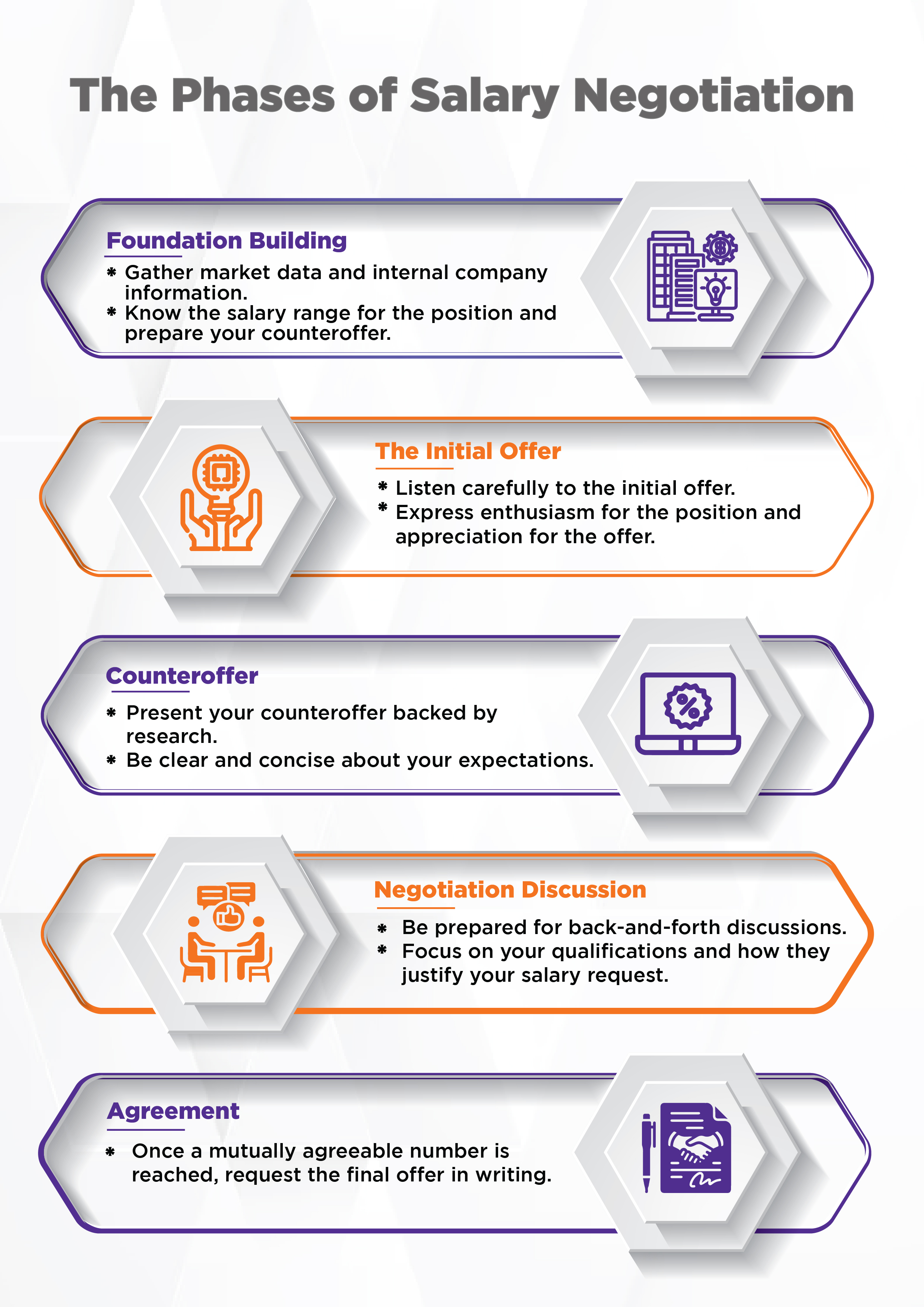Salary negotiation is a critical skill that can significantly impact your career trajectory and overall financial well-being. Whether you are negotiating a starting salary, a raise, or switching jobs, knowing how to effectively communicate your value can lead to better compensation and job satisfaction. This guide will walk you through the essential strategies and tips for negotiating your salary with HR managers, ensuring you approach the process with confidence and success.
Why Negotiating Your Salary Matters
Salary negotiation is essential as it significantly influences your career growth, financial stability, and job satisfaction. It can result in higher earnings, improved benefits, and increased professional respect. Effective negotiation sets a positive tone for professional relationships and ensures fair compensation, contributing to job satisfaction and reducing financial stress. Moreover, a higher initial salary positively impacts future raises and bonuses, leading to greater long-term earnings.
Get a FREE resume assessment and prepare a better resume, before applying for a job. Get it HERE
Steps to Successful Salary Negotiation
1. Thorough Research
To successfully negotiate your salary, start by thoroughly researching industry standards for the position you are applying for, utilizing popular websites that offer valuable data. Next, evaluate your skills, experience, and the value you bring to the table, considering how your unique qualifications align with the job requirements. Finally, build confidence by role-playing negotiation scenarios with a friend or mentor.
2. Timing of Your Negotiation
Negotiation opportunities arise at different stages of your career. When negotiating during the offer stage, it's most effective to discuss terms after receiving a formal job offer but before accepting it. During performance reviews, especially after completing successful projects or during formal evaluations, timing your request for a raise can enhance your chances of a positive outcome. Negotiations are also appropriate when switching roles within your current company or when being considered for a promotion, as these transitions often involve discussions about compensation and responsibilities.
3. Understanding the Phases of Salary Negotiation

4. Effective Salary Negotiation Tips
- Be confident but polite: Confidence shows that you believe in your worth, but politeness ensures that the negotiation remains professional.
- Use data and facts: Justify your request with concrete data about industry standards and your qualifications.
- Consider the entire compensation package: Sometimes benefits and bonuses can make up for a lower salary.
- Stay positive: Focus on the positive aspects of the job and how you can contribute to the company’s success.
How to Ask for a Higher Starting Salary
- Express gratitude: Start the conversation by thanking the employer for the offer.
- Present your case: Clearly articulate why you believe a higher salary is warranted, using your research and qualifications as backing.
- Be specific: State the salary range or specific amount you are targeting.
- Stay open-minded: Be willing to discuss and find a compromise that works for both parties.
Negotiating a Raise
- Prepare evidence: Document your achievements, contributions, and any additional responsibilities you have taken on.
- Choose the right time: Request a meeting during a favorable time, such as after a successful project or during annual reviews.
- Be clear and direct: Clearly state your request for a raise and support it with your evidence.
Feeling unprepared to face behavioural interviews? Read the blog here: Cracking The Code Mastering Behavioral Interviews With The Star Method
Common FAQs in Salary Negotiation
Q1: What if the employer says no?
If the employer rejects your request, ask for feedback on what you can do to earn a higher salary in the future. This shows your willingness to grow and improve.
Q2: Can I negotiate if the job posting states the salary is non-negotiable?
Yes, you can still negotiate. Express your enthusiasm for the position and present your case. Even if the salary isn’t flexible, other aspects of the compensation package might be.
Q3: Should I disclose my current salary during negotiations?
It’s generally best to avoid disclosing your current salary. Instead, focus on the value you bring to the new role and industry standards.
Q4: What if I'm uncomfortable negotiating?
Negotiation is a skill that can be developed. Researching common tactics and practicing beforehand can boost your confidence.
Q5: When should I negotiate?
The ideal time to negotiate salary is after receiving a formal job offer.
Q6: What if I'm not happy with the final offer?
It's okay to walk away if the offer doesn't meet your minimum requirements. Thank HR for their time and continue your job search.
Q7: Is it better to negotiate in person or via email?
In-person or over the phone negotiations are generally more effective as they allow for real-time dialogue. However, email can be useful for documenting discussions and agreements.
Q8: Should I consider a counteroffer from my current employer?
Consider whether the counteroffer addresses your reasons for wanting to leave. Sometimes, underlying issues remain unresolved despite a higher salary.
Q9: Can I negotiate benefits besides salary?
Absolutely. You can negotiate for additional vacation days, flexible working hours, remote work options, professional development opportunities, and other benefits.
Q10: How much of a salary increase should I ask for?
A reasonable range is typically 10-20% above your current salary or the initial offer, depending on your research of industry standards and your qualifications.
Do’s and Don’ts of Salary Negotiations
Do’s:
- Do your homework: Research thoroughly before negotiating.
- Be professional: Maintain a positive and respectful tone.
- Do practice: Rehearse your negotiation points.
- Do consider the entire package: Look at the full compensation, not just the salary.
Don’ts:
- Don’t be aggressive: Aggressiveness can damage your professional image.
- Don’t accept the first offer without question: It’s often possible to negotiate a better deal.
- Don’t make it personal: Keep the discussion focused on your professional value.
- Don’t lie: Always be truthful about your qualifications and salary expectations.
Examples of Salary Negotiation Emails
Example 1: Initial Salary Negotiation
Subject: Salary Negotiation for [Job Title]
Dear [HR Manager’s Name],
Thank you for offering me the position of [Job Title] at [Company Name]. I am excited about the opportunity to contribute to your team. After reviewing the offer, I would like to discuss the base salary. Based on my research and industry standards, I was expecting a salary in the range of [Your Target Salary]. I believe this reflects my experience and the value I can bring to [Company Name].
I am open to discussing this further and finding a mutually beneficial agreement. Thank you for considering my request.
Best regards,
[Your Name]
Example 2: Requesting a Raise
Subject: Salary Adjustment Request
Dear [Manager’s Name],
I hope this message finds you well. I am writing to request a review of my current salary. Over the past year, I have [mention achievements and additional responsibilities]. I believe these contributions demonstrate my value to the team and justify a salary revision..
I am looking forward to discussing this further and am open to any feedback you may have. Thank you for your time and consideration.
Best regards,
[Your Name]
What do you do after a successful or unsuccessful salary negotiation?
Successful Negotiations
- You receive a salary increase or improved benefits package.
- Your relationship with the employer remains positive and professional.
Unsuccessful Negotiations
- The employer is unable to meet your salary request.
- Consider the overall compensation package and if the position still aligns with your career goals.
- Reflect on the negotiation process and identify areas for improvement in future negotiations.
Additional Tips for Successful Negotiation
Here are some additional tips for successful salary negotiations beyond the initial offer:
Track your achievements: Maintain a record of your accomplishments, awards, and positive feedback throughout the year. This documentation will be crucial when advocating for a raise during performance reviews.
Stay informed about industry trends: Keep yourself updated on salary trends for your position and location. This knowledge will empower you to make informed decisions during negotiations.
Develop new skills: Continuously expand your skills through training or certifications. This demonstrates your commitment to professional growth and justifies higher compensation.
Be willing to walk away: Know your bottom line and be prepared to walk away from the negotiation if the offer doesn't meet your minimum requirements.
Build relationships: Building strong relationships with your manager and colleagues can make salary negotiations more successful. When you have positive working relationships, employers are more likely to see you as a valuable asset and be willing to invest in you.
Get it in writing: Once you and your employer reach an agreement, be sure to get everything in writing. This will help to avoid any misunderstandings in the future.
Conclusion
Navigating salary negotiations with HR managers requires preparation, confidence, and professionalism. By understanding your worth, timing your negotiations correctly, and approaching the conversation strategically, you can secure a compensation package that reflects your value. Remember, successful negotiation is not just about the numbers but also about fostering a positive and respectful professional relationship.
Are you a soon-to-be graduate eagerly preparing to enter the job market? Read the blog here: Ahead Of The Curve How To Get A Job Before Graduation




